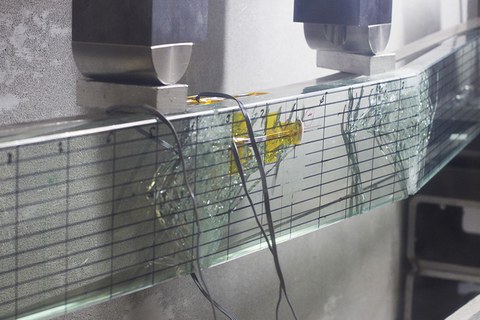Oct 21, 2020
New Publication on Post-Tensioned Glass Beams in Composite Structures Journal
Flexural behaviour of post-tensioned glass beams: Experimental and analytical study of three beam typologies
The concept of post-tensioned glass beams builds on the concrete analogy of the reinforced glass beams. By additionally prestressing the reinforcement in a post-tensioned system, a compressive pre-stress is applied on the glass, enhancing the initial fracture resistance in bending. This paper presents three post-tensioned beam systems tested in four-point bending. The effects of both adhesive bonding and mechanical anchoring of tendons are explored in order to define an optimised beam system which can provide a significant level of compressive pre-stress and maximise the efficient use of material. The tests demonstrate the feasibility of post-tensioning by providing a substantial level of additional load capacity and redundancy to commonly applied laminated glass beams. Several specimens have demonstrated premature failure governed by lateral-torsional buckling or by shear. Since glass beams are generally not strengthened through transversal reinforcement, as concrete elements, further investigation of the mechanism of shear failure is particularly important. Analytical models, based on the pre-stressed concrete theory, provide expressions for determination of the initial fracture resistance, initial stiffness and ultimate flexural capacity. Compared with the experimental results, the models provide close prediction values for the initial fracture loads, while the predictions of the initial stiffness and ultimate post-fracture load capacity show less consistency. Closer prediction requires a better understanding of the effect of specific anchoring, the level of composite action and the post-fracture behaviour of laminated glass (including long-term and temperature effects).
Weblink to the paper:
https://doi.org/10.1016/j.compstruct.2020.112971
Authors:
- Dr. Jagoda Cupac (TU Dresden)
- Prof. Christian Louter (TU Dresden)
- Prof. Alain Nussbaumer (EPFL)

